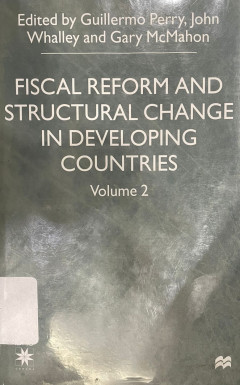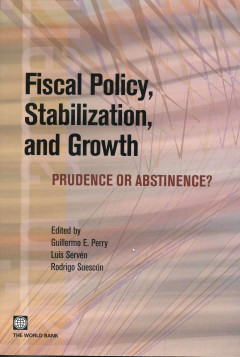Ditapis dengan

Fiscal Reform and Structural Change in Developing Countries
Fiscal Reform and Structural Change in Developing Countries analyzes the experience of countries involved in major tax reforms in the 1980s and first half of the 1990s by a combination of qualitative and quantitative country studies and over-arching thematic studies. The emphasis is on the role of fiscal reform in stabilization and structural change, as well as the effects that policy for stabi…
- Edisi
- -
- ISBN/ISSN
- 0-312-23581-X
- Deskripsi Fisik
- xiii, 185 p.: ill.; 21 cm.
- Judul Seri
- -
- No. Panggil
- 336.309 172 4 PER f

Transisi menuju demokrasi
- Edisi
- -
- ISBN/ISSN
- 979-8391-10-1
- Deskripsi Fisik
- xvii, 280 Hal. ; 22,5 cm
- Judul Seri
- -
- No. Panggil
- 321.4 TRA
- Edisi
- -
- ISBN/ISSN
- 979-8391-10-1
- Deskripsi Fisik
- xvii, 280 Hal. ; 22,5 cm
- Judul Seri
- -
- No. Panggil
- 321.4 TRA

The Ramon Magsaysay Awards
- Edisi
- -
- ISBN/ISSN
- 971-1044-8
- Deskripsi Fisik
- 367 hal : 23 cm
- Judul Seri
- -
- No. Panggil
- -
- Edisi
- -
- ISBN/ISSN
- 971-1044-8
- Deskripsi Fisik
- 367 hal : 23 cm
- Judul Seri
- -
- No. Panggil
- -

analyzing health equity using household survey data
equity has long been considered an important goal in the health sector. yet inequalities between the poor and the better-off persist.
- Edisi
- -
- ISBN/ISSN
- 978-0-8213-6933-3
- Deskripsi Fisik
- xi, 220 p. : il. ; 27 cm.
- Judul Seri
- -
- No. Panggil
- -

Fiscal policy, stabilization, and growth
Fiscal policy in Latin America has been guided primarily by short-term liquidity targets whose observance was taken as the main exponent of fiscal prudence, with attention focused almost exclusively on the levels of public debt and the cash deficit. As a result, fiscal policy has often amplified cyclical volatility and dampened growth.
- Edisi
- -
- ISBN/ISSN
- 978-0-8213-7084-1
- Deskripsi Fisik
- xv, 329 hal. : il ; 23 cm
- Judul Seri
- -
- No. Panggil
- -

Prinnciples of real estate
- Edisi
- -
- ISBN/ISSN
- 0-7216-6911-5
- Deskripsi Fisik
- v, 610 hal : il. ; 30 cm
- Judul Seri
- -
- No. Panggil
- -
- Edisi
- -
- ISBN/ISSN
- 0-7216-6911-5
- Deskripsi Fisik
- v, 610 hal : il. ; 30 cm
- Judul Seri
- -
- No. Panggil
- -
 Karya Umum
Karya Umum  Filsafat
Filsafat  Agama
Agama  Ilmu-ilmu Sosial
Ilmu-ilmu Sosial  Bahasa
Bahasa  Ilmu-ilmu Murni
Ilmu-ilmu Murni  Ilmu-ilmu Terapan
Ilmu-ilmu Terapan  Kesenian, Hiburan, dan Olahraga
Kesenian, Hiburan, dan Olahraga  Kesusastraan
Kesusastraan  Geografi dan Sejarah
Geografi dan Sejarah